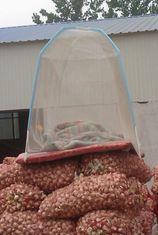
Garlic has emerged as one of the world’s most prized commodities, with stories of smuggling and paranoia affecting those dealing with the product.
The bulb is now seen as a key investment, with the product exceeding gold last year as China’s best performing asset. But unsolicited activity is now said to be rife among traders wanting to cash in on the boom.
Supply of garlic from China is being outstripped by demand, enabling producers to charge a premium. The hike in price is at unprecedented levels, with prices up to 1,000 per cent higher than they were two years ago.
According to market analyst Mintec, the price of fresh garlic in the UK has risen by 63 per cent since the start of the year due to strong demand and poor supply. Last year’s was a particularly poor quality global crop, with lower than average yields. The northern garlic harvests of 2010 are underway, but much of the Chinese supply - which represents 77 per cent of the world’s production - has been delayed by colder than normal spring weather earlier this year.
To safeguard stocks, Chinese producers have employed guards to camp out on top of garlic mountains - protecting the product from would-be hijackers.
The import of fresh Chinese garlic to the UK is subject to a 9.6 per cent EU-wide duty, along with a further €1.20/kg levy added by the European parliament to protect European garlic farmers affected by the imports.
To circumvent the duty, smuggling by traders is now common and UK manufacturers are suffering as a result.
There have been around 1,200 tonnes of garlic brought into the EU via Norway since 2009, according to the European Anti-Fraud Office, due to Norway being exempt from customs duties. This has avoided more than €1.5 million of duty, a figure that is set to double throughout 2010.
One source said: “The white garlic bulb could soon become a luxury item - as opposed to one we currently see included in everyday cooking. Will the time now arise for other illegal smugglers to recognise this and turn their attention to a more ‘legitimate’ product? Not perhaps as silly as it sounds.



